|
|
|
Sort Order |
|
|
|
Items / Page
|
|
|
|
|
|
|
| Srl | Item |
| 1 |
ID:
110587


|
|
|
|
|
| Publication |
2011.
|
| Summary/Abstract |
Korea's exchanges with the West only effectively began after World War II. This makes the situation in Korea very different from that of China or Japan, where various exchanges with Western countries were already being carried out in the sixteenth century. The introduction of modernised research methods was also delayed. Nevertheless, Korean medicine (KM) has been well modernised, while at the same time traditional medicine, less tainted by the wave of modernisation, has been preserved. Moreover, KM is now attracting young and capable talent of a kind never before seen in this field. Often reduced in Chinese official discourse to a mere variant of Traditional Chinese Medicine (TCM), KM in fact constitutes a tradition of its own. This paper tracks the history of KM using time classification in order to better inform Western society regarding KM.
|
|
|
|
|
|
|
|
|
|
|
|
|
|
|
|
| 2 |
ID:
110594


|
|
|
| 3 |
ID:
110590
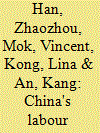

|
|
|
|
|
| Publication |
2011.
|
| Summary/Abstract |
The promulgation of the Labour Contract Law in China has aroused heated debate about the financial burden of the new labour costs for firms. However, based on a data set collected in Guangdong Province in southern China, the empirical findings suggest that, on average, the increase in labour costs per capita in the sample firms due to the effects of the law ranges between 2.54 percent and 4.90 percent, which seems to be economically insignificant.
|
|
|
|
|
|
|
|
|
|
|
|
|
|
|
|
| 4 |
ID:
110593


|
|
|
| 5 |
ID:
110585


|
|
|
|
|
| Publication |
2011.
|
| Summary/Abstract |
In November 2010, UNESCO included "Acupuncture and moxibustion as part of Chinese traditional medicine" on its Representative List of the Intangible Cultural Heritage of Humanity. Already in 2006, a national list of oral and intangible masterpieces of heritage was drawnup. Nine of them pertained to medicine and traditional pharmacopoeia. Since then, two other national lists have been compiled, containing medical elements. This article analyses the challenges of Chinese medicine's "patrimonialisation" by retracing the discipline's recent as well as much older history. Contents of different lists are examined in this perspective. Chinese medicine finds itself in a paradoxical situation, compared in practical terms with biomedicine, in perpetual reclassification, and held up for good or for bad reasons. Its inclusion in the cultural heritage list highlights many problematic issues, such as master-disciple transmission, vague teaching methods, questions as to the scientific nature or otherwise of its practices, and the industrialisation of its pharmacopoeia. In conclusion, questions may be raised over the link between protection and denaturation throughout the heritage designation process.
|
|
|
|
|
|
|
|
|
|
|
|
|
|
|
|
| 6 |
ID:
110589
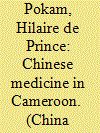

|
|
|
|
|
| Publication |
2011.
|
| Summary/Abstract |
China's arrival on the African economic scene is overturning the balance of forces in place since the independence of African countries. Africa is regarded by some as a "new hunting ground" or "promised land" for China, making it part of its global strategy. This article sets out to examine one of China's so-called "soft power" strategies, represented by the widespread practice of Traditional Chinese Medicine overseas. It focuses on Cameroon, which is a mainstay for Central Africa on account of its harbour and its regional economic dominance.
|
|
|
|
|
|
|
|
|
|
|
|
|
|
|
|
| 7 |
ID:
110588


|
|
|
|
|
| Publication |
2011.
|
| Summary/Abstract |
This article is based on the results of comparative research into the appearance and integration of Chinese medicine (often limited to acupuncture in Europe) into French and Italian medical contexts during the twentieth century. The relationship between Chinese and conventional medicine and attempts at complementarity are studied, using as a starting-point a vast number of interviews with medical practitioners, observations of training sessions in the field, the study of the archives of the major French and Italian associations and schools of acupuncture and Chinese medicine, and a qualitative analysis of questionnaires distributed in training institutions. The motivations of French and Italian acupuncturists are also analysed, as are their representations of Chinese medicine. Particular attention is paid to a comparison between the French and Italian situations.
|
|
|
|
|
|
|
|
|
|
|
|
|
|
|
|
| 8 |
ID:
110591


|
|
|
|
|
| Publication |
2011.
|
| Summary/Abstract |
The Chinese currency, Renminbi Yuan (RMB), has had restricted convertibility outside the mainland, namely in Hong Kong, from early 2004. From July 2009, much wider convertibility has been permitted, with the RMB being used as a cross-border trade settlement currency. This paper attempts to assess the factors that have motivated RMB internationalisation, and the role Hong Kong has played in the process, against the background of China's evolving foreign exchange markets and the RMB exchange rate benchmarking to the Hong Kong market. It shows that China's ultimate goal of full convertibility of the capital account has provided the underlying motivation for RMB internationalisation, and that the 2008 global financial crisis acted as a catalyst in the process. With the political blessing of the central authorities and its extensive business and financial links with the mainland, Hong Kong has gradually established an RMB offshore market to supplement capital account liberalisations on the Mainland. The prospects for RMB internationalisation will be determined by the growth of the Chinese economy, reinforcing flows of RMB funds between the offshore Hong Kong and onshore Shanghai markets, and the balanced development of these two markets.
|
|
|
|
|
|
|
|
|
|
|
|
|
|
|
|
| 9 |
ID:
110586
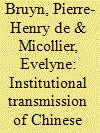

|
|
|
|
|
| Publication |
2011.
|
| Summary/Abstract |
The aim of this article is to propose a typology of the different issues that the transmission of traditional Chinese medicine encounters today in the world, by successively highlighting ideological, epistemological, political, and educational difficulties. After showing how much the polarised aspect of the debates on Chinese medicine is already entrenched among specialists in this discipline, we explore the question of the epistemological status of this Chinese tradition by confronting it with the dominant biomedicine of Western origin. The originality of Chinese structures that were set up to protect and promote this national tradition is then highlighted as a possible source of inspiration at the international level, before describing the different economic factors likely to play a positive or negative role in the development of this medical and cultural heritage at the local level. Finally, the specific didactic questions that the transmission of this heritage and the teaching of this discipline raise are analysed before presenting a conclusion.
|
|
|
|
|
|
|
|
|
|
|
|
|
|
|
|
| 10 |
ID:
110592
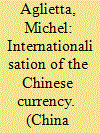

|
|
|
| 11 |
ID:
110584
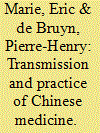

|
|
|
|
|
| Publication |
2011.
|
| Summary/Abstract |
Chinese medicine is a medical system that was developed in China over a long period of time and has subsequently spread over the rest of the world, especially over recent decades. This study aims first to identify this medicine and to examine the changes that accompanied its institutionalisation in the People's Republic of China starting in the 1950's, then to set out the continuities and breaking points that have characterised the ways in which it is transmitted, from traditional apprenticeship training to the development of national university syllabuses. It then looks into the way in which Chinese medicine has faced up to biomedicine and sets out a comparative analysis of the paradigms of these two systems, before describing the way in which this exotic medicine has been received and adapted in the West. This makes it possible to grasp the difficulties and issues involved in its globalisation and the increasingly pressing need, from the perspective of university teaching and research, for a more complete, objective and pragmatic approach to studying it.
|
|
|
|
|
|
|
|
|
|
|
|
|
|
|
|
|
|
|
|
|